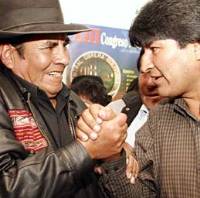
Rechts op de foto ziet u Evo Morales, een indiaan die midden deze maand tot de nieuwe president van Bolivia is gekozen. Morales brengt 'een verfrissende wind voor alle inheemse volkeren,' zegt de Guatemalteekse Nobelprijswinnares Rigoberto Menchú. Inheemse leiders in heel Latijns-Amerika zijn opgetogen dat Bolivia voor het eerst een president van inheemse afkomst krijgt. Voor het eerst in 500 jaar sinds de verovering van Amerika door de Europeanen. Vandaag werd hij door Fidel Castro ontvangen. Het alternatieve nieuwsagentschap Countercurrents publiceert een toespraak van Evo Morales waarin hij ondermeer dit zegt: 'What happened these past days in Bolivia was a great revolt by those who have been oppressed for more than 500 years. The will of the people was imposed this September and October, and has begun to overcome the empire's cannons. We have lived for so many years through the confrontation of two cultures: the culture of life represented by the indigenous people, and the culture of death represented by West. When we the indigenous people together with the workers and even the businessmen of our country fight for life and justice, the State responds with its "democratic rule of law." What does the "rule of law" mean for indigenous people? For the poor, the marginalized, the excluded, the "rule of law" means the targeted assassinations and collective massacres that we have endured. Not just this September and October, but for many years, in which they have tried to impose policies of hunger and poverty on the Bolivian people.Above all, the "rule of law" means the accusations that we, the Quechuas, Aymaras and Guaranties of Bolivia keep hearing from our governments: that we are narcos, that we are anarchists. This uprising of the Bolivian people has been not only about gas and hydrocarbons, but an intersection of many issues: discrimination, marginalization , and most importantly, the failure of neoliberalism. The cause of all these acts of bloodshed, and for the uprising of the Bolivian people, has a name: neoliberalism. With courage and defiance, we brought down Gonzalo Sanchez de Lozada the symbol of neoliberalism in our country on October 17, the Bolivians' day of dignity and identity. We began to bring down the symbol of corruption and the political mafia... What I want to tell you, compañeras and compañeros what I dream of and what we as leaders from Bolivia dream of‹ is that our task at this moment should be to strengthen anti-imperialist thinking. Some leaders are now talking about how we the intellectuals, the social and political movements can organize a great summit of people like Fidel, Chávez and Lula to say to everyone: "We are here, taking a stand against the aggression of the US imperialism." A summit at which we are joined by compañera Rigoberta Menchú, by other social and labor leaders, great personalities like Pérez Ezquivel. A great summit to say to our people that we are together, united, and defending humanity. We have no other choice, compañeros and compañeras if we want to defend humanity we must change system, and this means overthrowing US imperialism.That is all. Thank you very much.'
http://www.countercurrents.org/bolivia-morales221205.htm
www.countercurrents.org is an alternative news site. "We bring out what the mainstream media fails to tell you, or hides from you. These are the things that really matter. The things which may determine the fate of planet earth! The future of our children! In a word, the survival of the species!"



Geen opmerkingen:
Een reactie posten